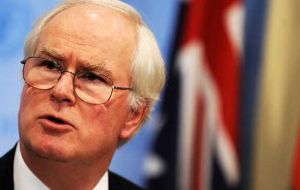MercoPress. South Atlantic News Agency
UK ratifies position on new Security Council permanent members but wants to limit veto right
 UK supports new permanent seats for Brazil, Germany, India and Japan, alongside permanent African representation, said Ambassador Lyall Grant
UK supports new permanent seats for Brazil, Germany, India and Japan, alongside permanent African representation, said Ambassador Lyall Grant The UK supports new permanent seats for Brazil, Germany, India, Japan and an African representation as part of the reforms to the United Nations Security Council, said Ambassador Sir Mark Lyall Grant of the UK Mission to the UN, during a debate at the General Assembly.
“You are all familiar with the UKs position on Security Council reform. It has not changed. The United Kingdom supports new permanent seats for Brazil, Germany, India and Japan, alongside permanent African representation. We also support a modest expansion in non-permanent seats. Next year, we will celebrate the 70th anniversary of the UN and the 10th anniversary of the Summit Declaration. Let us mark these occasions with genuine action on reform” pointed out Ambassador Grant.
“Disagreement around whether or not to extend the veto rights has proven one of the key obstacles to making any progress on UN Security Council reform. A priority for all of us must be to ensure that any reform does not reduce the Council’s capacity to effectively deal with threats to international peace and security. The UK does not support the extension of veto rights to new permanent members”.
We note with interest the French initiative for voluntary P5 veto restraint and welcome the motives that lie behind this as well as the valuable debate it has sparked. We have been appalled by the cynical way in which the veto has been used since 2011 to enable the perpetuation of mass atrocities and war crimes by the Syrian regime. We cannot envisage the circumstances in which the United Kingdom would use its veto to block an appropriate response to a mass atrocity or other major crisis. To be meaningful, this initiative would of course need the united support of all the permanent members of the Council.
“It is important that arguments on contentious issues such as the veto are heard, but we also need to be careful to ensure that the range of different and opposing views around the veto should not distract us from the important task of broadening the membership of the Council to ensure it is a better reflection of the modern world.
Ambassador Grant concluded by reaffirming the UK's commitment to improving the UN Security Council’s working methods, and improving the Council’s effectiveness must go hand in hand with any discussion around increasing its size.
”The UK works hard to ensure that the Council is continually looking at new ways to improve in efficiency, effectiveness and transparency, including through using technological advancements. We are always open to new practical suggestions for improvement and welcome the constructive spirit in which the ACT group has engaged in discussions on the Council’s working methods”.





Top Comments
Disclaimer & comment rules-

-

-

Read all commentsThe security council doesn't work very well with the current number of veto holding members. Current holders will not give up that right but adding to that number will just freeze up the council enabling it to do nothing. This seems like a sensible compromise - but China won't want India or Japan, Argentina will be irked by Brazil and lots of other nations will be “whataboutmeing”
Nov 14th, 2014 - 09:57 am 0I predict lots of talking and no change.
I think the level headed Falkland Islanders should be on the SC.
Nov 14th, 2014 - 10:46 am 0FAR more first world than the Brazil Nuts.
I fail to see any justification for Brazil to be a permanent member of the Security Council. I can't see anything that Brazil has EVER done to justify such a position. If there has to be a south american member, let it be Chile. Although I am starting to have general reservations about that country. I would also be against India. A nuclear weapons state that hasn't signed either the Comprehensive Nuclear-Test-Ban Treaty or the Nuclear Non-Proliferation Treaty? Not to be trusted. Of slightly less importance is India's connections with Russia. Nor can I see any obvious contender for an African seat.
Nov 14th, 2014 - 11:52 am 0China, France, Russia, the UK and the USA at least put themselves on the line for WW2. Applying that criteria, what did Brazil, India or an African country do? Brazil made a contribution, but only a contribution. India was taken in by the British Empire. As for Africa, the only possible member would be South Africa. But South Africa has fallen by the wayside. It's not what it was.
Regarding non-permanent seats, I reckon these should be discontinued. The more members a committee has the less likely it is to reach agreement. It will just wrangle endlessly. It finds it almost impossible to be decisive now. Imagine it with 15 or more members.
So, once we have decided, the new permanent members can replace the current non-permanent members. And such new permanent members should definitely not have veto power. Assuming that Germany and Japan are willing to serve, it will have taken 70 years, at least, to mend the bridges. New permanent members should have to serve at least 70 years before even having the opportunity to progress beyond 'probation'.
Indeed, I would still have reservations about Germany and Japan. Taking into account peacekeeping responsibilities, what has China done? And what could either Germany or Japan do?
Commenting for this story is now closed.
If you have a Facebook account, become a fan and comment on our Facebook Page!